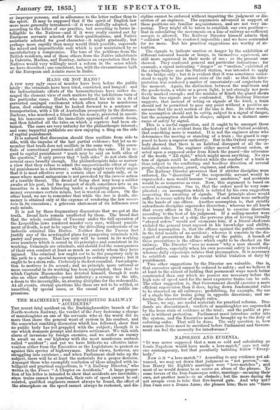HANG OR NOT - ITS NG P
A FZW very ugly cases of murder have been before the public lately : the criminals have been tried, convicted, and hanged ; and the indiscriminate efforts of the humanitarians have rather da- maged the clement view of such matters by the infelicitous turn of the particular cases. Horler, who murdered his wife in a fit of perverted conjugal excitement which often turns to murderous furor, died confessing that he looked forward to a sentence of transportation, with a life of Australian prosperity in the distance. Barbour, who murdered a friend for his money, persisted in assert- ing his innocence until the immediate approach of certain doom, and then falsified all the tales on which a reprieve had been ob- tained. The cases are very unlucky for the philanthropic interest; and some impartial publicists are now enjoying a fling on the side of capital punishment.
It is natural that discussion should thus oscillate from side to side, with the impulse of the last partial evidence ; but let us re- member that truth does not oscillate in the same way. The essen- tials of correctional punishment still remain the same. If in re- gard to capital punishment "much may be said on both sides of the question," it only proves that "both sides" do not state their several eases broadly enough. The philanthropists take so narrow a view that they refuse to admit the unquestionable effect of capi- tal punishment as a deterrent; while they might very fairly argue that it is most effective over a certain class of minds only, or in eases where moral antagonism is not provoked by the inverse action of a terrible threat. The dread of being shot may keep a soldier awake at his post, but the prospect of death sometimes acts as an incentive to a man labouring under a despairing passion. Cle- mency overcomes certain minds, but is wasted on others. On the other hand, we are to remember that while the law is death, cle- mency is attained only at the expense of rendering the law uncer- tain in its execution; a grievous abatement of its influence over rude minds.
It is not by these fragmentary discussions that we get at the truth. Broad facts remain unaffected by them. The broad fact that the whole condition of Tuscany under the full operation of the Leopoldine laws rendered murder very rare, without punish- ment of death, is not to be upset by the drivelling confessions of an imbecile criminal like Horler. Neither does the Tuscan fact justify any of the newfangled plans for pampering criminals with pastry and prayers. That law only will be sound in its working over numbers which is sound in its principles and consistent in its working. Criminals are criminals, and should feel the consequences of their own conduct at least as much as society whom they have injured. The criminal law ought not to be the purgatory only in the yeth to a special heaven unopened to ordinary sinners ; but it ought to be a stern rule. Certainty is its first essential. Just adapta- tion to motives is its second; and no principle more rational or more successful in its working has been expounded, than that to which Captain Maconochie has devoted himself, though it rests also on other authority—penal industry ; a scourge to the idle, a doom to the incorrigible, an atoning discipline for the redeemable. At all events, eternal questions like these are not to be settled, or unsettled, by special cases, or the casual turn of public im- pressions.


































 Previous page
Previous page